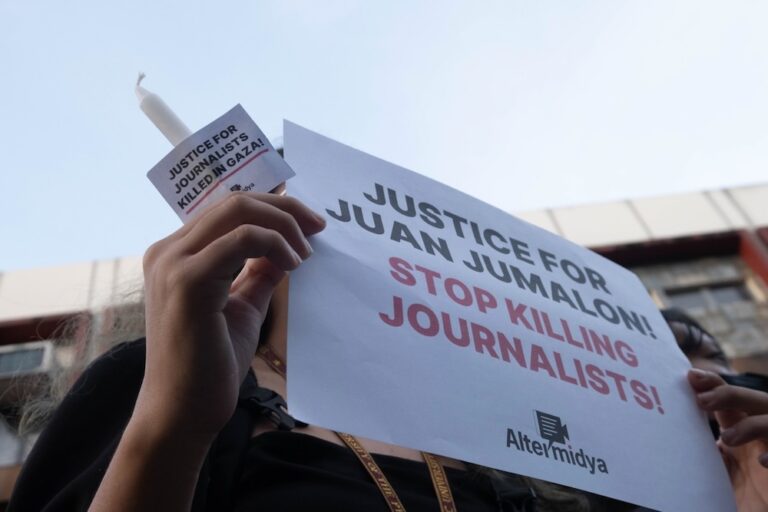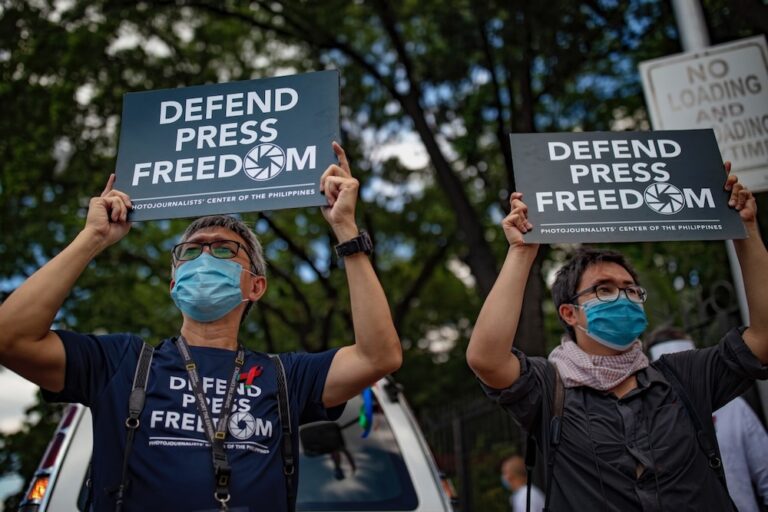For the media community, the decision represents a battle won in the war against the culture of impunity that has encouraged the continued killing of journalists.
UPDATE: Still no alias warrant for alleged masterminds in Esperat murder (CMFR, 5 June 2012)
(CMFR/IFEX) – The following is a statement of the Freedom Fund for Filipino Journalists (of which CMFR is a member) on the denial of the Petition for Certiorari and Prohibition filed by the alleged masterminds in the killing of Marlene Esperat:
In a decision dated 19 August 2011, the Court of Appeals Twenty-First Division of Cagayan de Oro City dismissed the Petition for Certiorari and Prohibition filed by Osmeña Montañer and Estrella Sabay, the alleged masterminds in the murder of journalist Marlene Esperat. It took the appellate court’s Mindanao station almost two years to respond. But its 26-page decision reveals the care it took in arriving at the decision.
By dismissing the petition, the Court of Appeals Mindanao Station is in effect allowing the service of the warrant of arrest against Montañer and Sabay. It is now up to the law enforcers, particularly the Task Force Usig of the Philippine National Police, to make the arrests and make possible the resumption of criminal proceedings against the two accused before the Regional Trial Court of Makati City. For the widower and children of Marlene Esperat, it means a step closer to closure in their quest for justice, which began in 24 March 2005 when a gunman walked into their house in Tacurong City, Sultan Kudarat, and shot Marlene.
Notorious for its protracted conduct, Philippine court litigation has been described by some legal luminaries as “inter-generational”. In many cases, it has become a matter of settling for the lesser evil. In this instance, three months shy of two years waiting for a just decision is certainly preferable to receiving a swift but unjust one.
This is not to say the judiciary is incapable of rendering just decisions promptly, but more often than not, clogged court dockets make it an exception rather than the rule. Oft-abused provisions of the Rules of Court add to this woe.
In finding Montañer and Sabay guilty of forum shopping, the appellate court cited the Supreme Court in a 2001 case, “The most important factor in determining forum shopping is the ‘vexation caused the courts and the parties-litigants by a party who asks different courts to rule on the same or related causes or grant the same or substantially the same relief’.” With the recognition that forum shopping causes “vexation” on the part of the courts and parties-litigants, it is hoped that the judiciary will no longer tolerate such delaying tactics.
For the media community, the decision represents a battle won in the war against the culture of impunity that has encouraged the continuing killing of journalists. Because this is the first time that the alleged masterminds have been charged before the courts, and are likely to be arrested and tried, it will send one more message to those who cannot abide the work of journalists, and who choose to silence them, that they will not always get away with murder.
FFFJ is a coalition of six media organizations: the Center for Media Freedom and Responsibility (CMFR), the Center for Community Journalism and Development, the Kapisanan ng mga Brodkaster ng Pilipinas (The broadcasters’ association), the Philippine Press Institute, the Philippine Center for Investigative Journalism, and the US-based “Philippine News”. It was founded in 2003 to assist in the prosecution of the killers of journalists and to provide humanitarian assistance to the families of slain journalists and media workers.
MORE INFORMATION: Family asks court to order arrest of alleged “mastermind” (CMFR, 19 April 2012)


